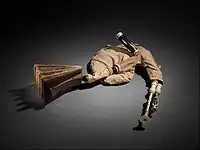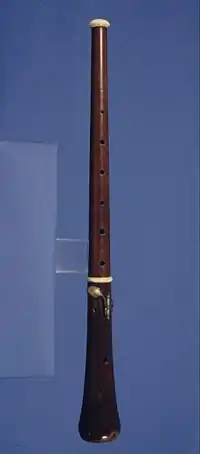musette
English
Etymology


From both of the following:[1]
- Late Middle English musette (“type of bagpipe”),[2] from Middle French musette, Old French musette (“type of bagpipe”) (modern French musette), from muse (“bagpipe”) + -ette (diminutive suffix). Muse is derived from muser (“to play the bagpipe; (figuratively) to flatter”),[3] perhaps from musel (“muzzle (protruding part of an animal’s head)”) (alluding to a bagpipe player puffing out the cheeks), from Late Latin mūsus (“muzzle”); further etymology uncertain, perhaps expressive of protruding lips and/or influenced by Latin mūgiō (“to bellow, low, moo”), from Proto-Indo-European *mug-, *mūg- (onomatopoeia of the lowing of cattle).
- Borrowed from French musette in the 18th century.
Sense 2 (“small bag or knapsack with a shoulder strap”) is due to the resemblance of the original knapsack to the bag of bagpipes.[3]
Pronunciation
- (Received Pronunciation) IPA(key): /mjuːˈzɛt/, /mjʊ-/
Audio (Southern England) (file) - (General American) IPA(key): /mjuˈzɛt/
- Rhymes: -ɛt
- Hyphenation: mus‧ette
Noun
musette (plural musettes)
- (music)
- (historical) Any of various small bagpipes having a soft sound, especially with a bellows, which were popular in France in the 17th and early 18th century. [from 14th c.]
- Synonyms: pastoral oboe, shepherd's pipe
- (historical) An organ stop using reed pipes with cone-shaped resonators, found in organs in France in the 17th and 18th centuries. [from 19th c.]
- A small oboe without a cap for its reed, which evolved from the chanter or pipe of bagpipes; a piccolo oboe. [from 19th c.]
- Synonyms: oboe musette, piccoloboe
- (historical) Any of various small bagpipes having a soft sound, especially with a bellows, which were popular in France in the 17th and early 18th century. [from 14th c.]
- (chiefly US, originally military) In full musette bag: a small bag or knapsack with a shoulder strap, formerly used by soldiers, and now (cycling) chiefly by cyclists to hold food and beverages or other items. [from 20th c.]
- (cycling): Hyponym: bonk bag
- 1923, [Ernest Hemingway], “Out of Season”, in Three Stories […] & Ten Poems […], [Paris: Contact Publishing Company]; printed at Dijon by Maurice Darantière, →OCLC, page 13:
- The young gentleman had a musette over his shoulder.
- 1929 May–October, Ernest Hemingway, chapter 23, in A Farewell to Arms, 1st British edition, London: Jonathan Cape […], published 1929, →OCLC, book II, page 156:
- I gave them money for platform tickets and had them take my baggage. There was a big rucksack and two musettes.
- 1961 November 10, Joseph Heller, “Yo-Yo’s Roomies”, in Catch-22 […], New York, N.Y.: Simon and Schuster, →OCLC, page 362:
- Yossarian watched Chief White Halfoat pour whiskey carefully into three empty shampoo bottles and store them away in the musette bag he was packing.
Related terms
Translations
Notes
- From the collection of the Metropolitan Museum of Art in New York City, New York, U.S.A.
References
- “musette, n.”, in OED Online
 , Oxford, Oxfordshire: Oxford University Press, March 2022; “musette, n.”, in Lexico, Dictionary.com; Oxford University Press, 2019–2022.
, Oxford, Oxfordshire: Oxford University Press, March 2022; “musette, n.”, in Lexico, Dictionary.com; Oxford University Press, 2019–2022. - “mūsette, n.”, in MED Online, Ann Arbor, Mich.: University of Michigan, 2007.
- “† muse, n.2”, in OED Online
 , Oxford, Oxfordshire: Oxford University Press, December 2021.
, Oxford, Oxfordshire: Oxford University Press, December 2021.
Further reading
 musette (disambiguation) on Wikipedia.Wikipedia
musette (disambiguation) on Wikipedia.Wikipedia  piccolo oboe on Wikipedia.Wikipedia
piccolo oboe on Wikipedia.Wikipedia  glossary of cycling on Wikipedia.Wikipedia
glossary of cycling on Wikipedia.Wikipedia
French
Etymology
Inherited from Middle French musette, Old French musette (“type of bagpipe”), from muse (“bagpipe”) + -ette (diminutive suffix). Muse is a deverbal of muser (“to play the bagpipe; (figuratively) to flatter”), perhaps from musel (“muzzle (protruding part of an animal’s head)”) (alluding to a bagpipe player puffing out the cheeks), from Late Latin mūsus (“muzzle”); further etymology uncertain, perhaps expressive of protruding lips and/or influenced by Latin mūgiō (“to bellow, low, moo”), from Proto-Indo-European *mug-, *mūg- (onomatopoeia of the lowing of cattle).
Pronunciation
- IPA(key): /my.zɛt/
Audio (file)
Noun
musette f (plural musettes)
Derived terms
Further reading
- “musette”, in Trésor de la langue française informatisé [Digitized Treasury of the French Language], 2012.
